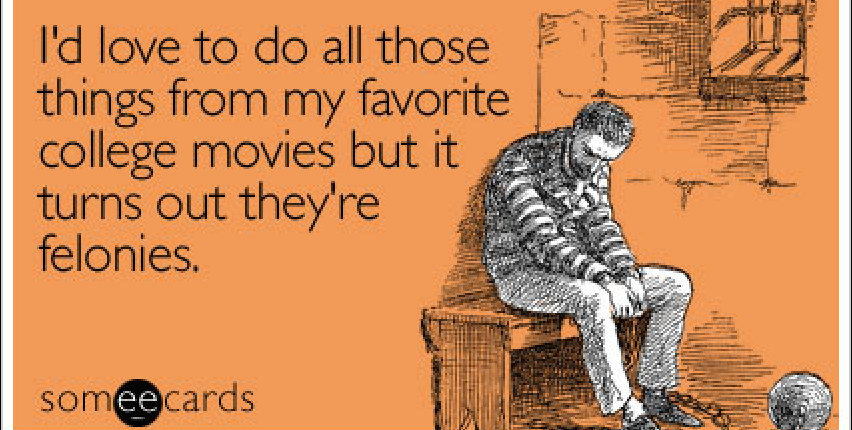College life, beyond media portrayals and generalizations
Where do we get the idea of what college is supposed to be like? I usually end up eating strawberry sorbet and singing along to the Moulin Rouge soundtrack in old pajamas on a Saturday night. I know people who do the same, but I also know a lot of people who love to go out on the weekend and dance the night away.
There seems to be an underlying consensus of what college should be like; usually between “the best time of your life” and “I haven’t slept for three days straight I can’t feel my arms I think I’m dying,” both of which can become toxic to health and contentment of young adults. When we expect college to be a certain way, we run the risk of constantly comparing our experiences to what we’ve been told is the “college experience,” mostly fueled by Hollywood movies and perpetrated stereotypes by our peers. If a student’s idea of success if based off a comparison of fabricated ideals and their individual circumstances, they may feel they’re doing something wrong, or failing, or not cut out for college in general. The consensus on the binge-drinking, all-nighter, romantically promiscuous, overtly spirited, wide-eyed smiling plastic-storage-container-holding college student is more a generalization than a genuine portrait of college life. College is what the individual makes of it; and this is your reminder.
The stereotypes that box students in by what major they study aren’t limited to outside forces, but continually supported within the university. Quizzes and personality tests that narrow engineering majors down to specific races and basic traits of non-social behavior, philosophy majors as pretentious, bio majors as too engrossed in their studies to have a life of their own. These continue to feed into the separation of majors by schools. Viterbi kids against the world. Marshall kids versus pre-med kids. Art History majors caught between Dornsife and Roski’s turbulent marriage. How are we supposed to be one student body when we are so divided along lines of pithy difference? Those differences are what make us stronger. It doesn’t matter how beautiful an architect designs a building unless you can fill it with beautiful art or live a healthy existence in that building thanks to, you know, doctors. Fill it with some music recorded over at Thornton, read a book by an english major, and perhaps look up articles online on how to live your life without so much unnecessary resentment toward others based on silly stereotypes.
Boxing students in by major is just the beginning of a slippery slope. By being so easily influenced by stereotypes and depictions of college life in movies and television, students fall into extremely dangerous drinking habits, and non-white students face an even greater challenge. Being black at USC is a completely different experience than it is for ignorant white kids who share their racist opinions (and “jokes”) in class, thinking their words have no affect on people. Girls have to hear proposals for better street lighting on the Row instead of proposals to expel and shut down the perpetrators of sexual assault. International students have to face culture shock as well as language bias. Take the multiple hoops and barriers placed in front of students who need support from Student Disabilities for instance. How strenuous, emotionally draining and expensive it is to find mental health assistance, especially without health insurance. Even when you can find help, how ineffective and unfulfilling it can feel.
There are a lot of problems within the university only because universities are microcosms for the larger brutal bureaucracy we will be graduating into. Students who feel isolated and alienated by the same social inequalities experienced outside of school should not have to feel like they are all to blame for this. The university you attend, the university that promises again and again to nourish and cultivate in you a sense of safety, purpose, family and place is failing you.
The majority of students at USC can’t live up to the expectations they place in front of the reality of their situation. The expectations of what we think college should be like are harmful to our exploration of new ideas and ways of looking at the “Trojan Family” as something more than just competition or alumni to network with.
We need to stop glorifying harmful behavior. We need to stop stereotyping. We need to stop congratulating poor time management. We need to start living the healthy life WE want, even need, to lead — not the life pop culture wants us to lead. Something as simple as ignoring the stereotypes we place on different majors is a step toward a more united campus and not one divided along lines of “us” vs. “them.”
It’s not hard. There are so many barriers in place that need to be torn down as a collective in order to enact real change. By breaking down our own personal barriers first, this can be possible, but only if we make a collective effort.
“College is about big life choices,” says the Spotify ad that constantly interrupts my Moulin Rouge soundtrack. Spotify’s right, but the big life choices we can make are so much richer and important and long-lasting than the limited views from an apartment couch or university issued mattress can reveal.

